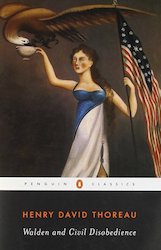
Walden was the June selection for my Great Books Read-Along on my BookTube channel. (You can see the full video here.)
I have read and taught excerpts from this many times, but this is the first time I’ve ever sat down to read it straight through.
Most of the famous bits happen in the first three chapters, about economy, why he lived in the woods, and reading. The rest describes Thoreau’s two years and two months in the woods near Walden Pond. Much of it is extravagant descriptions of the natural world and how Thoreau thinks everyone should live. (There is a self-righteous tone to a lot of Thoreau’s “advice.”)
Essentially his argument is that people should forget about society and should live frugally and more naturally. That breaks the cycle of property becoming the owner’s real master. For everyone caught up in the current anti-clutter trend, Thoreau’s arguments will strike a chord. He’s proud of how little he owns or needs. He boasts about how he really only has to work for six weeks each year in order to finance the rest of the year.
Walden is an important work, but it has the overtones of fanaticism that can make some of his advice a little difficult to take seriously. First of all, it’s not really possible to simply squat instead of owning property today. Second, very few people can live as spartanly as Thoreau did, both in terms of facilities and diet. And third, it’s far more difficult today to opt out of government oversight.
But I’m glad I read it, even the tedious bits.
I have read and taught excerpts from this many times, but this is the first time I’ve ever sat down to read it straight through.
Most of the famous bits happen in the first three chapters, about economy, why he lived in the woods, and reading. The rest describes Thoreau’s two years and two months in the woods near Walden Pond. Much of it is extravagant descriptions of the natural world and how Thoreau thinks everyone should live. (There is a self-righteous tone to a lot of Thoreau’s “advice.”)
Essentially his argument is that people should forget about society and should live frugally and more naturally. That breaks the cycle of property becoming the owner’s real master. For everyone caught up in the current anti-clutter trend, Thoreau’s arguments will strike a chord. He’s proud of how little he owns or needs. He boasts about how he really only has to work for six weeks each year in order to finance the rest of the year.
Walden is an important work, but it has the overtones of fanaticism that can make some of his advice a little difficult to take seriously. First of all, it’s not really possible to simply squat instead of owning property today. Second, very few people can live as spartanly as Thoreau did, both in terms of facilities and diet. And third, it’s far more difficult today to opt out of government oversight.
But I’m glad I read it, even the tedious bits.
 RSS Feed
RSS Feed
